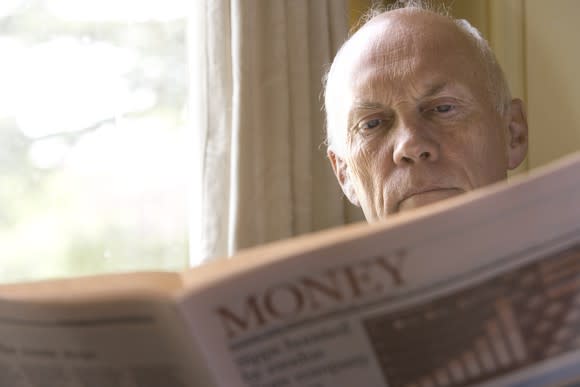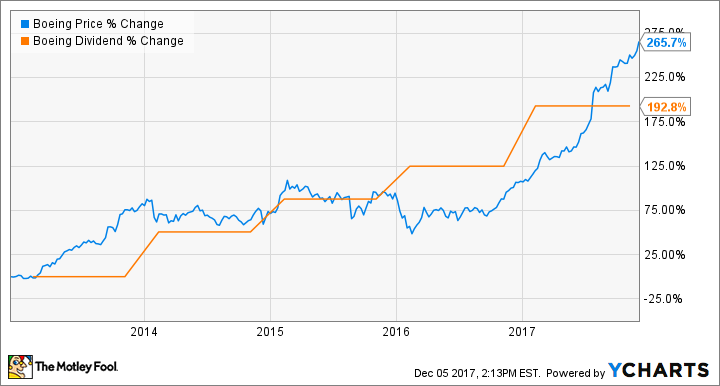3 Dividend Stocks Perfect for Retirees
Retiring today is a lot different from retiring 30 years ago. People today are living much longer, which means you'll need to continue investing long after you've hung up your work coat or gloves for good.
But retirees don't want to buy a run-of-the-mill stock. They want a company that'll pay out a superior dividend over time, as well as preserve their capital with minimal downside risk.
With this in mind, we asked three of our Foolish investors to offer up a dividend stock that they believe could be perfect for retirees. Moving to the top of the list were telecom and content behemoth AT&T (NYSE: T), aircraft and defense juggernaut Boeing (NYSE: BA), and pharmaceutical kingpin Pfizer (NYSE: PFE).

Image source: Getty Images.
Your wallet will be quite content with this content giant
Sean Williams (AT&T): While it's far from the most exciting choice, retirees looking for at a steady dividend stock to add their portfolio with minimal downside risk should consider AT&T.
The nation's No. 2 wireless carrier and burgeoning content giant has had a rough go of things recently. The Justice Department recently put the kibosh on AT&T's proposed acquisition of Time Warmer, and its third-quarter operating results came in below expectations because of a large earthquake in Mexico and the impact of hurricanes in the United States. In addition, tougher competition in traditional pay TV markets cost it about 90,000 video subscribers during the quarter.
However, AT&T still remains a rock among the telecom industry. There's something to be said about the exceptionally higher barrier to entry in becoming a content provider. The infrastructure costs are immense, which means AT&T has just a few major competitors to concern itself with. Its brand-name and 4G LTE wireless network alone puts it near the head of the pack, and gives the company fairly consistent market share.
We also can't place too much blame on AT&T's struggles in the third quarter because of the noted natural disasters. Without the hurricanes in the U.S. and earthquake in Mexico, it would presumably have seen video subscriber gains. AT&T has made no secret that it's aiming to net substantial long-term growth from its DIRECTV acquisition, which has millions of customers in Mexico and Latin America. Video growth in Latin America could easily surpass that of the U.S. in the years to come.
All told, AT&T is current paying out more than 5% annually, yet it sports a payout ratio (i.e., the percentage of profit paid out as a dividend to shareholders) of just 67%. This implies long-term sustainability, and the likelihood of continued growth given its excellent pricing power and market share.
Juggernaut with upside
Daniel Miller (The Boeing Co.): Boeing is an intriguing, and nearly perfect, stock for those in retirement. You have a massive and stable company with a market capitalization around $165 billion, yet its stock price growth over the past half-decade isn't often found with such large companies.
While Boeing isn't exactly cheap, trading at a forward price-to-earnings ratio of 25, according to Morningstar.com estimates, the commercial aircraft business should power its overall growth and its new services division, targeting higher-margin business, should also help power the bottom line. Boeing's global services became the company's third major business unit on June 30, and management hopes the unit will be better focused on aerospace services, which it claims as one of its biggest growth opportunities, in a market worth roughly $2.6 trillion over the next decade.
The jury is out whether Boeing's more dedicated global services business unit will offer more competitive and effective services to customers, thus creating more value for investors. But either way, its 2% dividend is solid and growing, and the company remains well positioned to take its fair share of the projected 41,030 global commercial aircraft deliveries, valued at $6.1 trillion, over the next two decades.

Image source: Getty Images.
A sustainable income generator
George Budwell (Pfizer): Pfizer isn't going to win awards as a growth stock, thanks to its spate of blockbusters that have now lost exclusivity over the past few years. But this Big Pharma stock is a reliable income generator that's perfect for risk-averse investors such as retirees.
Pfizer's dividend yield of 3.6%, after all, is among the richest across the entire healthcare sector. Moreover, the drugmaker has now doled out a dividend for a whopping 315 consecutive quarters. That's an impressive track record that should reassure even the most conservative of investors.
Keeping with this theme, Pfizer also sports a comparatively low 12-month trailing payout ratio of 77%. Many of the drugmaker's Big Pharma peers, by contrast, have payout ratios on the wrong side of 100%. So, Pfizer's dividend is not only among the highest, but it's also arguably one of the safest within the healthcare sector as well.
Last but certainly not least, Pfizer's dividend also appears primed for a significant increase in 2018 because of the forthcoming tax legislation. If approved, the Republican tax plan would allow Pfizer to bring back tens of billions in foreign profits at a vastly reduced tax rate. Although the drugmaker may use a significant chunk of these repatriated funds to pursue a largish acquisition, there's also a good chance that Pfizer would also institute a special dividend payment to reward its loyal shareholders.
In all, it's hard to go wrong with Pfizer as a dividend stock, even though the company is continuing to undergo a major facelift from a product portfolio standpoint.
More From The Motley Fool
6 Years Later, 6 Charts That Show How Far Apple, Inc. Has Come Since Steve Jobs' Passing
Why You're Smart to Buy Shopify Inc. (US) -- Despite Citron's Report
Daniel Miller has no position in any of the stocks mentioned. George Budwell owns shares of Pfizer. Sean Williams has no position in any of the stocks mentioned. The Motley Fool recommends Time Warner. The Motley Fool has a disclosure policy.


